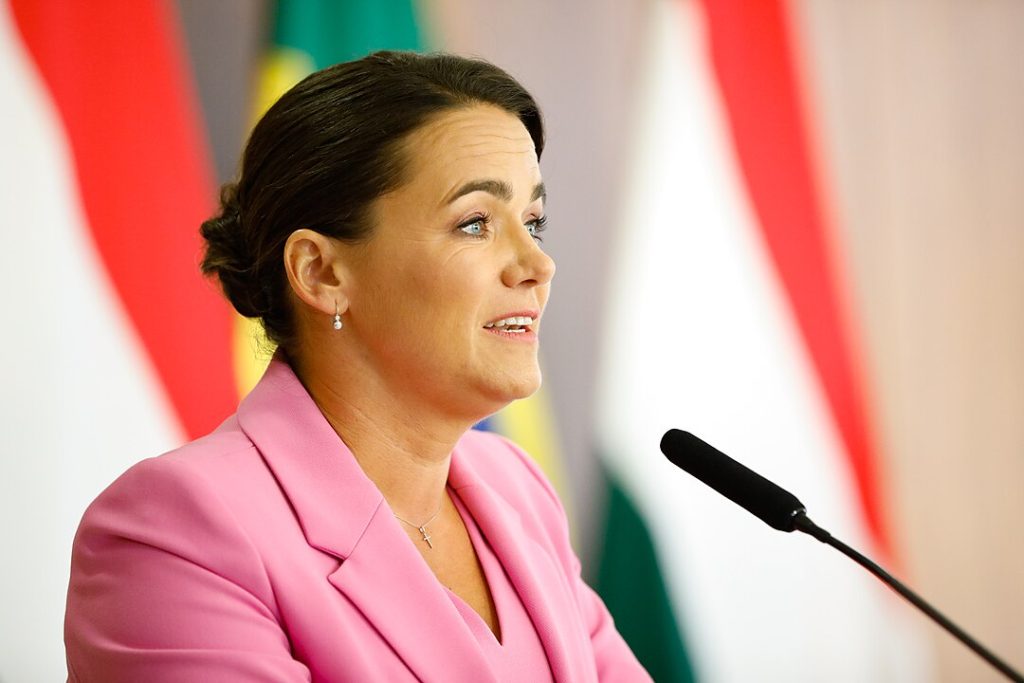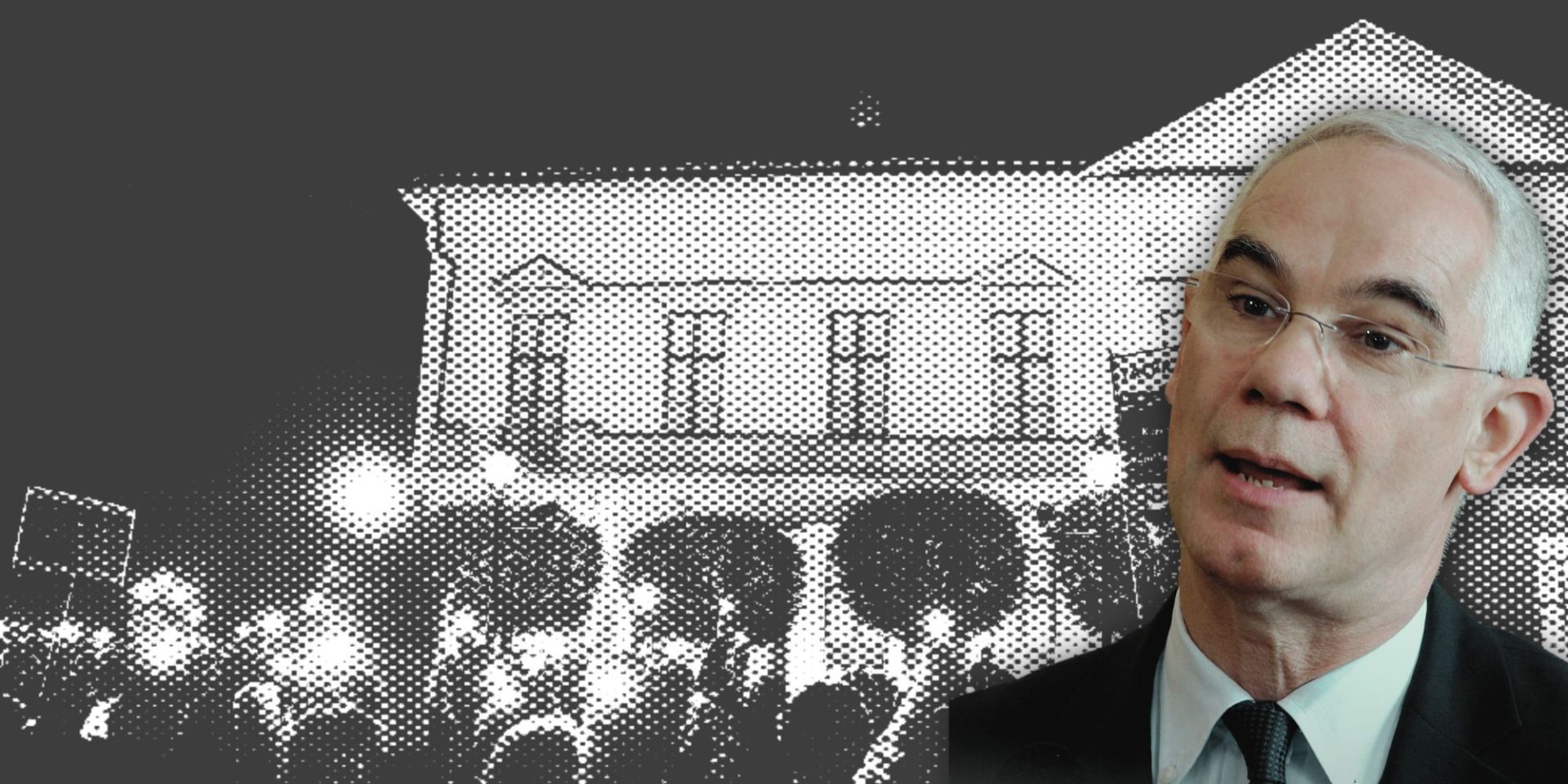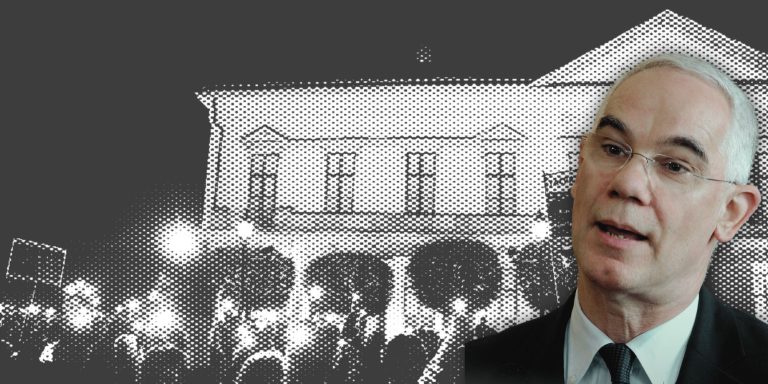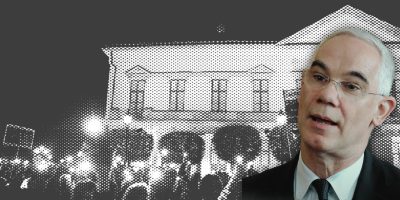Sarkadi Zsolt (Telex) 2024-02-19
Sarkadi Zsolt (Telex) 2024-02-19
Direkt36 and Telex have learned from several independent sources that head of the Hungarian Reformed Church Zoltán Balog, who has long been a confidant of Hungarian president Katalin Novák, played a crucial role in the presidential pardon which led to Novák’s resignation.
Since the publication of this article’s original Hungarian version, Balog acknowledged his role in the controversial presidential pardoning of a convicted pedophile’s accomplice, and stepped down from leading Hungary’s second largest church.
Although Katalin Novák has not publicly shared details of the presidential pardon that outraged the Hungarian public and led to her resignation, information obtained from within the Fidesz party and government circles helped clear the picture.
Several sources close to the government and the president’s office told Direkt36 and Telex that Zoltán Balog, the leader of the Hungarian Reformed Church, former minister of Orbán as well as advisor and long-time mentor of Novák, played an important role in the pardon.
A former senior official in the Orbán government said that his contacts in Novák’s office had said that it was Balog who had encouraged the president to grant a pardon to Endre K. The man had been a deputy director of an orphanage in the town of Bicske, and he was convicted for pressuring children to withdraw their testimonies against his boss, János Vásárhelyi, the director of the institution. The director himself is currently serving his jail sentence for sexually abusing children.
A source close to Novák also confirmed Balog’s involvement in pressing for a presidential pardon. The source added that, when the scandal broke and both Novák’s colleagues and Viktor Orbán’s team asked Balog for an explanation, the bishop defended himself by saying that it was not his personal decision, but that several people in the Reformed Church leadership wanted Endre K., who has good family ties to the church, to be pardoned.
An opposition politician with good government connections received the same explanation for the pardoning, both from the Fidesz faction and from Novák’s staff. “Politically, it was clearly Balog’s push for the pardon,” the politician said, adding that Novák’s entourage had long complained that “Balog had been showing up in the Sándor Palace to issue orders” and “he was meddling in everything”. The sources did not give details of the specific steps Balog had taken to grant the pardon.
Officially, Balog is a member of the president’s advisory council, but several sources familiar with the Novak-Balog relationship said that the Calvinist bishop had influence over Katalin Novak’s decisions that went far beyond his formal position. A former colleague of Novák’s, who was on good personal terms with her, said: “Kata would do anything for him.”
We tried to reach Zoltán Balog on several channels and sent him detailed questions but received no reply. Katalin Novák’s office did not react either.
On his official Facebook page, Balog shared the following post two days before Katalin Novák’s resignation, at the height of the scandal: “Retreating for a few weeks to pray, think, read and write in the silence of God. What a gift!” According to sources, several people close to Novak complained that Balog had taken this step and went abroad to pray and think just as the scandal was escalating.
Balog and the orphanage
It is not yet clear why it was so important for Balog to issue this pardon. On February 2, 444.hu revealed that Novák, citing last year’s papal visit to Hungary as reason for the clemency, had pardoned Endre K., the former deputy director of the Bicske children’s home, who, according to the court, helped cover up the director’s sexual crimes.
However, Balog’s name had already been mentioned before in connection with the Bicske pedophile case. For example, he was the one who in 2016 proposed a state award for János Vásárhelyi, the director of the children’s home who was later convicted of pedophilia. Balog may also have known Endre K., the deputy director who was later convicted for the cover-up, as they participated together in a conference organized by his ministry in 2013 titled ”Inclusion and Protection of Children in and through Sport”, which was aimed at stopping sexual violence against children. According to an article in Hvg.hu, Endre K.’s father was previously mentioned in press reports as a local Calvinist church official, and the family had influential friends and acquaintances.
Several sources – former government officials, sources familiar with the Reformed Church and personal acquaintances of Katalin Novák – have unanimously claimed that Zoltán Balog and Katalin Novák have long had an especially close personal relationship.

Katalin Novák in Brasil, 20/06/2022. Photo: Alan Santos / PR / Wikimedia Commons CC BY 2.0
Twenty years younger than him, Novák became a mentee of Balog, who guided her throughout her political career. From 2012, they had a close formal relationship for many years – first, Novák was then-Minister for Human Capacities Zoltán Balog’s chief of staff, then she became his state secretary. Although Balog left the government in 2018, he remained close to Novák, and after her election as president in 2022, he became a key member of Novák’s advisory team.
Over the years, Balog and Novák have taken several publicly funded exotic trips to far-away places such as Bogotá or, most recently, to Papua New Guinea in autumn 2023. The shared events and trips have continued despite the fact that Balog and Novák’s official functions have constantly changed. When they went to Bogotá, Novák was a state secretary and Balog was one of the prime minister’s commissioners. Recently, they travelled together to Papua as President of the Republic and presidential advisor (and bishop).
Judit Varga did not support a pardon
Information has also leaked out about the role of Judit Varga, the former minister of justice, who was also implicated in the pardoning scandal.
According to a government source familiar with the events from Novák’s side, what was first reported by far-right website Magyar Jelen, which is close to the Our Homeland party, is true: Judit Varga forwarded Endre K.’s pardon request to Novák without proposing it for support.
Several people close to Varga have confirmed that the then minister of justice did indeed not support the pardon.
However, Novák did sign it, according to sources, under the influence of Balog’s lobbying. According to a government source, Varga must have felt that she could not go against the president’s decision, however, she “made a mistake” by not asking the prime minister’s permission and by not informing Viktor Orbán at all. According to the source, Varga did so in good faith, because she thought that “the issue had been decided above her and her role was only formal.” (However, no other source could confirm that Viktor Orbán was not aware of the pardon decision in advance.)
According to a source close to Varga, the president’s staff probably expected that the case would not be made public, as presidential pardon cases are anonymous. But what happened here is that Endre K.’s case was referred to the Curia (the highest judicial authority in Hungary) for a third instance ruling. Then, in September last year, it was published in the Judicial Decisions Register official journal that Endre K. had been pardoned by Novák on April 27, 2023. This is how the previously anonymous case became identifiable, serving the basis for the 444.hu article on Endre K.’s case on February 2, thus triggering the scandal that led to the president’s resignation.
Balog’s possible role as head of the Reformed Church in the operations of the office of the President of the Republic and in specific pardon cases also raises questions because, under Hungarian law, the state and the church operate separately. The President of the Republic, as the guardian of constitutionality and as the highest public dignitary, is the number one representative of the Hungarian state, who, embodying the unity of the nation, must make decisions free of political and religious bias.
After the president’s resignation, Zoltán Balog shared a post on Facebook by a group titled “I stand by Katalin Novák”, which praises Novák saying, among other things, that “she is one of the few people who take responsibility for their mistakes.”
Sándor Joób and Gábor Miklósi contributed to this article.
Cover illustration: Protest to demand the resignation of Hungarian President Novak, in Budapest, February 9, 2024, credits: Bernadett Szabo / Reuters / Forum; Zoltán Balog, credits: Thaler Tamas / Wikimedia Commons CC 4.0
The article was originally published on direkt36.hu
VSquare’s Budapest-based lead investigative editor in charge of Central European investigations, Szabolcs Panyi is also a Hungarian investigative journalist at Direkt36. He covers national security, foreign policy, and Russian and Chinese influence. He was a European Press Prize finalist in 2018 and 2021.







